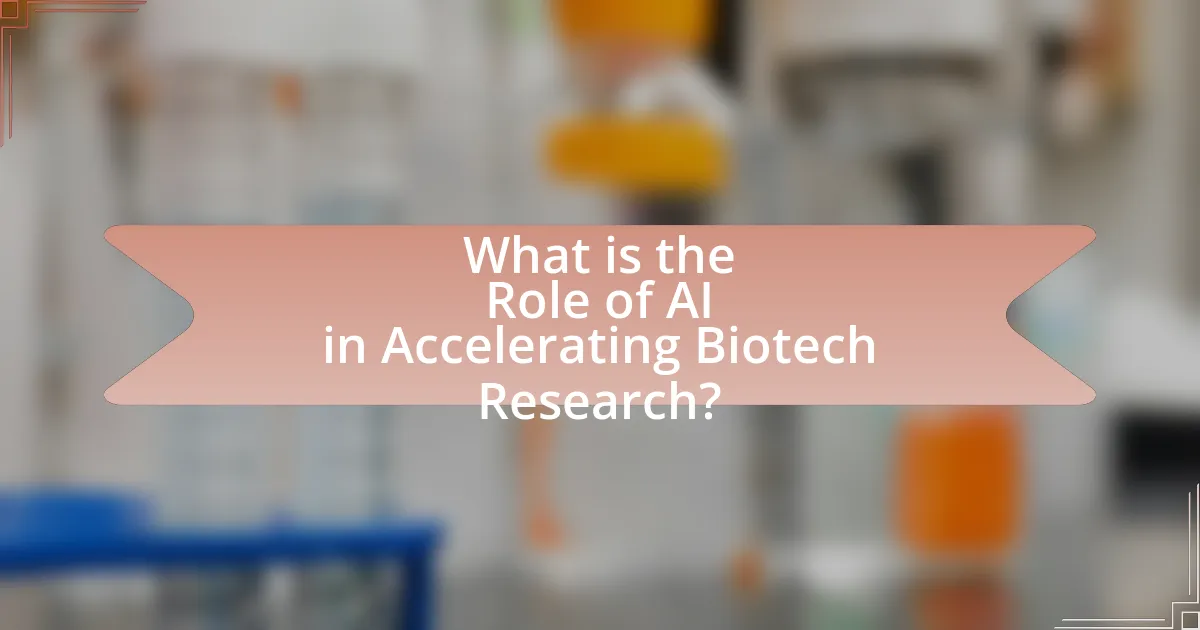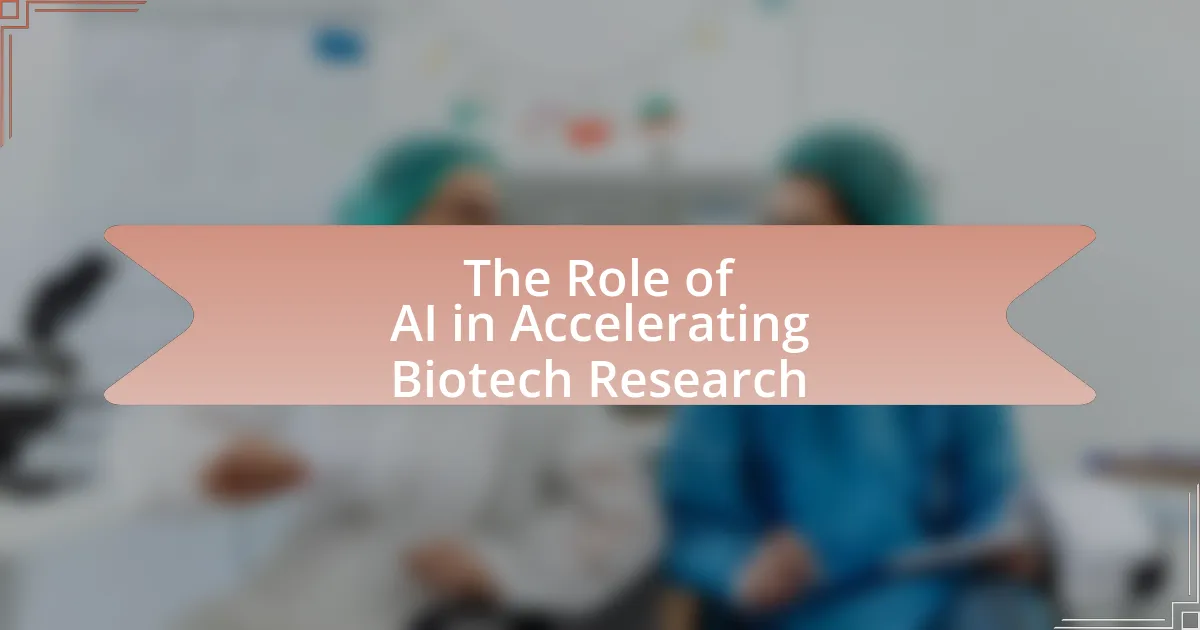The article focuses on the pivotal role of artificial intelligence (AI) in accelerating biotechnology research. It highlights how AI enhances data analysis, optimizes drug discovery, and improves predictive modeling, leading to significant advancements in precision medicine. Key AI technologies such as machine learning, natural language processing, and computer vision are discussed, along with their contributions to research efficiency and collaboration. The article also addresses ethical considerations, regulatory frameworks, and specific case studies that illustrate AI’s transformative impact on biotech, emphasizing its potential to streamline processes and improve patient outcomes.

What is the Role of AI in Accelerating Biotech Research?
AI plays a crucial role in accelerating biotech research by enhancing data analysis, optimizing drug discovery, and improving predictive modeling. For instance, AI algorithms can analyze vast datasets from genomics and proteomics, identifying patterns that human researchers might overlook. A study published in Nature Biotechnology demonstrated that AI-driven models could predict the efficacy of drug compounds with over 90% accuracy, significantly reducing the time and cost associated with traditional methods. Additionally, AI tools streamline clinical trial processes by identifying suitable patient populations and predicting outcomes, thereby expediting the overall research timeline.
How does AI contribute to advancements in biotech research?
AI significantly contributes to advancements in biotech research by enhancing data analysis, accelerating drug discovery, and improving precision medicine. For instance, AI algorithms can analyze vast datasets from genomic studies, identifying patterns and correlations that would be impossible for humans to discern. A study published in Nature Biotechnology demonstrated that AI models could predict protein structures with remarkable accuracy, which is crucial for drug development. Furthermore, AI-driven simulations can expedite the identification of potential drug candidates, reducing the time and cost associated with traditional methods. This integration of AI not only streamlines research processes but also leads to more personalized treatment options, ultimately advancing the field of biotechnology.
What specific AI technologies are utilized in biotech research?
Specific AI technologies utilized in biotech research include machine learning, natural language processing, and computer vision. Machine learning algorithms analyze large datasets to identify patterns and predict outcomes, which is crucial for drug discovery and genomics. Natural language processing enables the extraction of relevant information from scientific literature and clinical trial data, facilitating knowledge discovery. Computer vision assists in analyzing biological images, such as those from microscopy, to automate and enhance the accuracy of diagnostics. These technologies collectively enhance the efficiency and effectiveness of research processes in biotechnology.
How do these technologies enhance research efficiency?
AI technologies enhance research efficiency by automating data analysis and streamlining workflows. For instance, machine learning algorithms can process vast datasets quickly, identifying patterns and insights that would take human researchers significantly longer to uncover. A study published in Nature Biotechnology demonstrated that AI-driven tools reduced the time required for drug discovery by up to 50%, allowing researchers to focus on more complex tasks. Additionally, AI can optimize experimental design, leading to more effective use of resources and faster iteration cycles, further accelerating the research process.
Why is AI integration crucial for the future of biotech?
AI integration is crucial for the future of biotech because it enhances data analysis, accelerates drug discovery, and improves personalized medicine. The ability of AI to process vast amounts of biological data allows researchers to identify patterns and insights that would be impossible to discern manually. For instance, AI algorithms can analyze genomic data to predict disease susceptibility and treatment responses, significantly reducing the time required for clinical trials. According to a study published in Nature Biotechnology, AI-driven approaches can decrease drug development timelines by up to 30%, demonstrating the tangible benefits of AI in streamlining biotech processes.
What challenges in biotech research can AI help overcome?
AI can help overcome challenges in biotech research such as data analysis, drug discovery, and personalized medicine. By utilizing machine learning algorithms, AI can analyze vast datasets quickly, identifying patterns and insights that would take humans significantly longer to uncover. For instance, AI has been shown to reduce the time required for drug discovery by up to 70%, as evidenced by a study published in Nature Biotechnology, which highlighted how AI-driven platforms can predict molecular interactions more accurately than traditional methods. Additionally, AI enhances personalized medicine by analyzing genetic information to tailor treatments to individual patients, improving efficacy and reducing side effects.
How does AI improve data analysis in biotech?
AI improves data analysis in biotech by enhancing the speed and accuracy of processing large datasets, which is crucial for research and development. Machine learning algorithms can identify patterns and correlations in genomic data, enabling researchers to make informed decisions more quickly. For instance, AI-driven tools can analyze millions of genetic sequences in a fraction of the time it would take traditional methods, leading to faster drug discovery and personalized medicine approaches. Studies have shown that AI can reduce the time required for data analysis by up to 80%, significantly accelerating the pace of biotech innovations.
What are the ethical considerations of using AI in biotech research?
The ethical considerations of using AI in biotech research include issues of data privacy, informed consent, bias in algorithms, and the potential for misuse of technology. Data privacy is critical as AI systems often require access to sensitive genetic and health information, necessitating robust protections to prevent unauthorized use. Informed consent is essential, as participants must understand how their data will be used and the implications of AI-driven research. Bias in algorithms can lead to unequal treatment or outcomes, particularly if training data is not representative of diverse populations. Additionally, the potential for misuse of AI technologies raises concerns about biosecurity and the ethical implications of creating synthetic organisms or modifying genetic material. These considerations highlight the need for ethical frameworks and regulations to guide the responsible use of AI in biotech research.
How can AI impact patient privacy and data security?
AI can significantly impact patient privacy and data security by enhancing data protection measures while also introducing new vulnerabilities. AI technologies, such as machine learning algorithms, can analyze vast amounts of patient data to identify patterns and anomalies, thereby improving security protocols and detecting breaches more effectively. However, the use of AI also raises concerns regarding data misuse, as sophisticated algorithms can potentially be exploited to access sensitive information without authorization. According to a 2021 study published in the Journal of Medical Internet Research, 80% of healthcare organizations reported that AI implementation increased their risk of data breaches, highlighting the dual-edged nature of AI in this context.
What regulations govern the use of AI in biotech?
The regulations governing the use of AI in biotech primarily include the FDA’s guidelines for software as a medical device, the General Data Protection Regulation (GDPR) in Europe, and the Health Insurance Portability and Accountability Act (HIPAA) in the United States. The FDA oversees the safety and efficacy of AI applications in medical devices, ensuring they meet specific performance standards. GDPR regulates the processing of personal data, which is crucial when AI systems handle sensitive health information. HIPAA establishes standards for the protection of health information, impacting how AI systems manage patient data. These regulations collectively ensure that AI technologies in biotech are safe, effective, and compliant with privacy standards.
How does AI facilitate collaboration in biotech research?
AI facilitates collaboration in biotech research by enabling data sharing, enhancing communication, and streamlining project management. Through platforms that utilize AI algorithms, researchers can easily access and analyze vast datasets, fostering a collaborative environment where insights can be shared in real-time. For instance, AI-driven tools like IBM Watson have been used to analyze genomic data, allowing multiple research teams to work together on complex problems, thus accelerating the pace of discovery. Additionally, AI enhances communication by providing natural language processing capabilities that translate complex scientific jargon into more accessible language, making it easier for interdisciplinary teams to collaborate effectively.
What are the key trends in AI applications within biotech?
Key trends in AI applications within biotech include drug discovery acceleration, personalized medicine, and predictive analytics. Drug discovery has been significantly enhanced by AI algorithms that analyze vast datasets to identify potential drug candidates more efficiently, reducing the time and cost associated with traditional methods. For instance, a study published in Nature Biotechnology highlighted that AI can decrease the drug discovery timeline by up to 30%. Personalized medicine is increasingly utilizing AI to tailor treatments based on individual genetic profiles, improving patient outcomes; research from the Journal of Personalized Medicine indicates that AI-driven approaches can enhance treatment efficacy by 20%. Predictive analytics in biotech leverages machine learning to forecast disease outbreaks and patient responses, with a report from McKinsey showing that predictive models can improve clinical trial success rates by 25%. These trends demonstrate the transformative impact of AI in advancing biotech research and development.
What specific case studies illustrate AI’s impact on biotech research?
Specific case studies illustrating AI’s impact on biotech research include the use of AI by Insilico Medicine to identify new drug candidates for age-related diseases, which resulted in the discovery of a novel compound in just 46 days. Another example is the collaboration between IBM Watson and the pharmaceutical company Pfizer, where AI was utilized to analyze vast amounts of biomedical literature, leading to insights that accelerated drug development processes. Additionally, the application of DeepMind’s AlphaFold has revolutionized protein folding predictions, significantly enhancing the understanding of biological processes and aiding in drug discovery. These case studies demonstrate how AI technologies are transforming the biotech landscape by expediting research and development timelines.
How has AI accelerated drug discovery processes?
AI has accelerated drug discovery processes by enhancing the speed and efficiency of identifying potential drug candidates. Machine learning algorithms analyze vast datasets, including genomic, proteomic, and chemical information, to predict how different compounds will interact with biological targets. For instance, a study published in Nature Biotechnology demonstrated that AI models could reduce the time required for lead compound identification from years to mere months, significantly expediting the overall drug development timeline. Additionally, AI-driven simulations and predictive analytics help in optimizing drug formulations and minimizing adverse effects, further streamlining the discovery process.
What role does AI play in personalized medicine development?
AI plays a crucial role in personalized medicine development by enabling the analysis of vast amounts of genetic, clinical, and lifestyle data to tailor treatments to individual patients. This capability allows for the identification of specific biomarkers and the prediction of patient responses to therapies, enhancing treatment efficacy. For instance, AI algorithms can analyze genomic data to identify mutations associated with diseases, facilitating the development of targeted therapies. Studies have shown that AI-driven approaches can improve the accuracy of diagnosis and treatment selection, leading to better patient outcomes and reduced healthcare costs.
What best practices should researchers follow when implementing AI in biotech?
Researchers should follow best practices such as ensuring data quality, fostering interdisciplinary collaboration, and maintaining ethical standards when implementing AI in biotech. Ensuring data quality involves using high-quality, well-annotated datasets, as the performance of AI models heavily relies on the data they are trained on. Fostering interdisciplinary collaboration between biologists, data scientists, and ethicists enhances the development of robust AI solutions tailored to specific biotech challenges. Maintaining ethical standards is crucial, particularly in areas like patient data usage and algorithmic bias, to ensure compliance with regulations and public trust. These practices are supported by studies indicating that high-quality data and collaborative approaches significantly improve AI outcomes in biotech applications.


